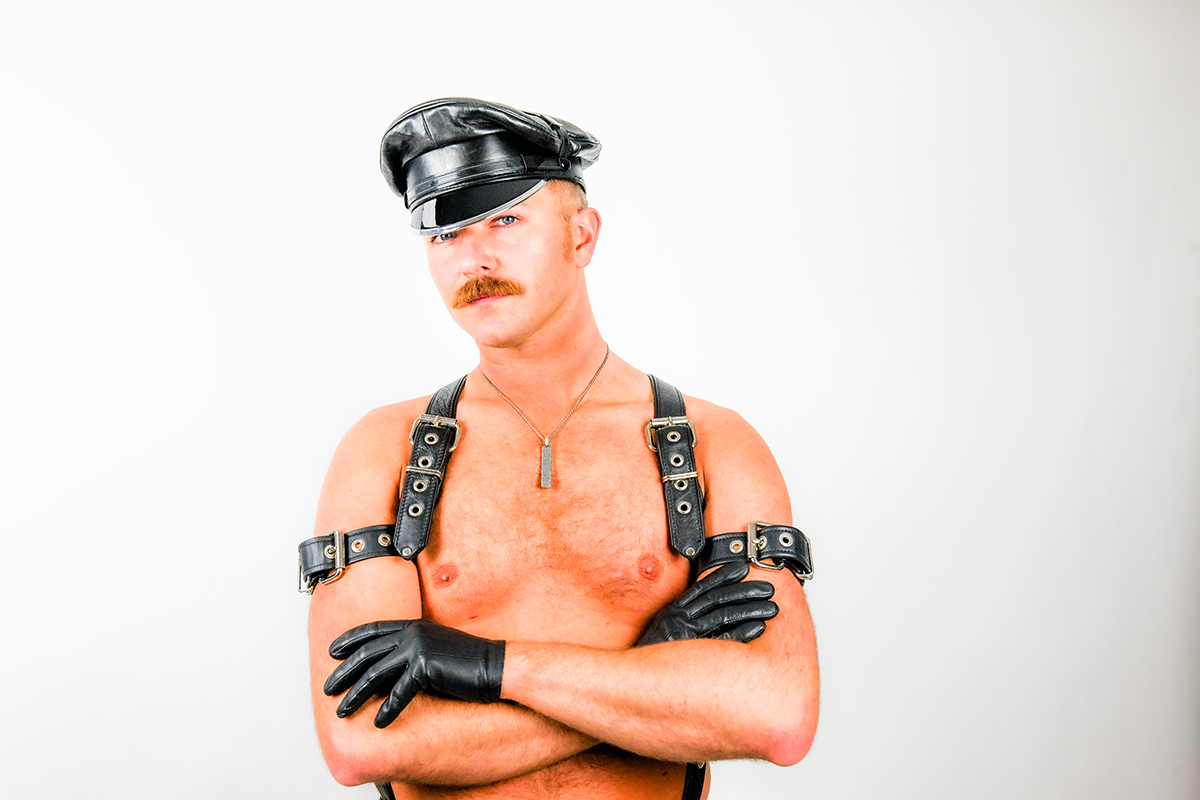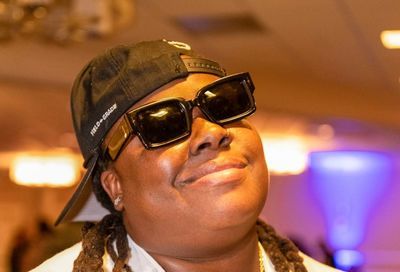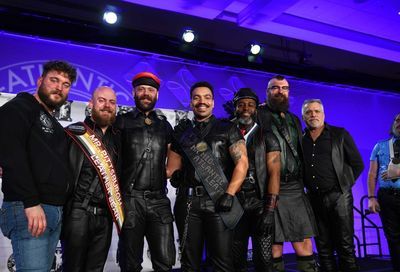Inside Tyler Hack’s Plan to Transform Trans Rights in America
Christopher Street Project founder Tyler Hack is creating a political machine to defend trans rights and elect pro-equality leaders.

Speaking from the podium at the World Pride Rally and March for Freedom in June, Tyler Hack joined some of the nation’s most prominent LGBTQ activist voices in raising the call to protect transgender kids.
The 20-year-old trans founder and executive director of the Christopher Street Project was also among the youngest leaders to rally the crowd at the Lincoln Memorial that day, and one with a clear stake in the trans rights movement.
Under attack from right-wing policymakers who make sport of chasing people into locker rooms and bathrooms, trans youth are in peril throughout the U.S. And Trump administration executive orders restricting access to health care, public spaces, and government-issued IDs that match their name and gender identity, have forced an already marginalized community into a fight for their right to exist.
The Christopher Street Project, based in New York City, joined that fight with a mission, according to the group’s website, to build and leverage “political power to make equity a reality for transgender people across the country.” The goal is to get champions for trans rights elected to office, and then supply them with the tools to maintain their political support.
The obstacles are many, particularly at this moment, but, as Hack said over a recent Zoom call, Christopher Street Project, part advocacy organization, part political action committee, is poised to make an impact.
“We’ve just hit the ground running,” says Hack. “We have formed really great relationships with members of Congress, with these fellow organizations who we’re working hand-in-hand with, and with many of these independent trans rights activists who have been with us from the very beginning.”
The beginning was not so long ago for Christopher Street Project, named after the New York City street where the legendary Stonewall Inn is located. Launched in January 2025, the all-volunteer, mostly LGBTQ-staffed upstart has quickly garnered support from high-profile Democrats like Jasmine Crockett and Andy Kim, while finding its light on the national stage.
The groundwork was laid in advance by Hack, then 19, working with, from what I’ve personally witnessed, a well-oiled team. “Before you start any type of organization,” Hack says, “I think it’s really important to make sure that — number one — you are filling a niche, filling a gap in a space.” Hack and company pinpointed their niche by probing the community.
“After the election, we had conversations with organizations, with trans rights activists, with policymakers asking people questions like, ‘Where do you get your talking points when it comes to trans issues?’ Asking people in the political action committee space, ‘Is there a PAC specifically focused on trans rights?'”
These questions guided the creation of Christopher Street Project, “because we realized that there was work that wasn’t being done that needed to be done,” Hack says.
“We also, number two, reached out to folks who have been doing this work for decades and people who were well-established in this space, making sure that people heard directly from us about what we were building and what we were trying to do.”
So the organization took pains not to step on toes as they built relationships, and the effort appears to have paid off. “Folks have been welcoming and have really realized the need for what we are doing here,” Hack says. “Which is specifically building political power for the trans community.”

METRO WEEKLY: How was your World Pride experience? Were you or the Christopher Street Project able to interface with D.C.-based policymakers while you were here?
HACK: Yeah, so as you can imagine, we have a close working relationship with many members of Congress. We have met with over 100 congressional offices to talk about what we’re working on to defend trans rights in this moment. We talk to those folks and make sure they know what’s going on, so it’s a continuous relationship. We want to make sure that people are hearing from us, that they’re getting rapid response messaging for all of the things that are coming out from the administration, and that we are there as a resource to be able to provide them with anything that they might need to be able to respond, and to be able to connect with queer folks and trans folks in their district and actually learn about their experiences.
The World Pride experience was great. It was amazing to meet so many folks who we’ve been working with, who we’ve admired for so long who have been leading the trans rights movement for so many years, and it is just amazing that we were able to congregate, bring everyone together and that we were able to set the tone for what Pride looks like.
It was really clear that Pride this year was a protest. I didn’t feel like folks were trying to pink-wash that or make it seem as though this was just a celebratory environment. We didn’t shy away from the hard topics, and I especially credit folks like Raquel Willis and Dr. Elijah Nicholas, who really spoke to what trans people are facing in this moment and how we need to step up and fight back in honor of Pride and in honor of the people who came before us.
MW: What would you consider CSP’s greatest success so far?
HACK: That’s a good question. I think the way that we’ve been able to bring together this movement so quickly, we have conversations with folks all the time where they’re like, “You just started this year?” They feel like they’ve known us for longer, or feel like the makeup of our organization represents something that has been around for years. And I think that is due to people realizing that what we are doing is needed and wasn’t being done before. But being able to see the election, see the days before the election with the spending over $200 million, of spending against trans kids, putting the faces of trans kids on TV, and being able to jump-in in that moment and say, “We see something that needs to be done that’s not being done. We have a month and a half or so. Let’s put something together and make it into a political machine that has been able to influence the conversation already, and is really ramping up our plans for 2026 and 2028,” is I think our biggest victory so far. And then of course we have smaller victories on the legislative front, partnerships with other organizations, things of that nature.
MW: What about the greatest challenge facing Christopher Street Project?
HACK: Folks like to rely on people who are familiar to them, people who have been in this space for a long time, and I think we did the best possible job of counteracting that as we could by getting out ahead, reaching out to folks that people trust beforehand, having those conversations. But still, when you’re jumping into a space as a new organization, it is challenging.
I’d say people could have been a lot more hesitant. This is definitely a group where people like to know each other, trans rights activists like to understand where all of these resources are coming from, and who is actually talking about these things. There are not that many of us in the core group of this trans legislative and electoral universe in the United States. But people really were able to see what we were looking to build and that there was no organization doing exactly that, which helped mitigate a lot of those concerns about duplicating work or doing anything that was being done by a number of organizations who have been doing this work for decades.
MW: The right spends a lot of money on anti-trans campaigning. Apart from the money, why do you think they’ve been able to be so effective at framing this issue from their side?
HACK: Democrats have fundamentally failed at responding to these issues. We can’t respond to something with nothing. If our only response is “Next question” or “We’re going to follow the law” — which is what Vice President Harris said when she was asked if she would support gender-affirming care for minors — that is not a message that resonates with everyday American people.
The fact is that even if you’re going to have a disagreement with people, people still like to see that you’re being honest, that you’re being upfront, that you are governing focused on values, and that you are being transparent with people about what you actually believe. It’s really important that people don’t think that this is an issue in which we’re trying to be evasive, because we have a very clear moral stance on this issue, which is that we need to protect every child and every person and make sure that they have access to health care and to all the things that they need to thrive.
Communicating that with people is a much more effective tactic at actually winning elections, because that is the end goal here — rather than just jumping to the next question. We are not telling Democrats to run on trans issues as their number one issue. That’s not our role here. But we’re also saying if a Republican is attacking you on it and is bringing this up and is spending millions of dollars in your race talking about how you support genital mutilation for kids, or boys in girls’ sports, it’s not effective to just brush off the question. And the results show that. So we’re building something that equips folks to respond to those attacks in a way that frames our morals and actually doesn’t leave anyone behind, while making sure that we get to that end goal, which is actually winning these elections.
MW: In addition to the trans rights champions that are listed on the CSP website — Jasmine Crockett, for example — what about those Democrats who have spoken on the side of anti-trans policies, like Tom Suozzi and Seth Moulton, and even Gavin Newsom. What inroads are you making with the Democrats you want to hold accountable for that kind of stuff?
HACK: Our legislative strategy expands beyond just folks who we know will be on our side. There are plenty of people who have been supportive of the trans community but don’t have the tools to actually speak out about it and share the messaging that we are pushing folks to use. And with those people, we want to make sure that they have the tools to be able to message, to get people on our team, and not only the general public, but their fellow members of Congress. It’s really effective when they are the ones actually messaging around this issue.
And then making sure that people who are supportive of the trans community — the folks you mentioned have spoken out in favor of trans rights at one point or another — that they have the courage to vote against something like the NDAA, the National Defense Authorization Act, which stripped TRICARE coverage for gender-affirming care for minors of active-duty service members. These are kids in military families who need their life-saving health care, and 70 Democrats voted for that bill. It would not have passed if Democrats didn’t back it. So making sure that they know that something like that is existential. It is a life-altering change for people to have their health care stripped away from them.
And in the same way that we’re fighting Republicans not to cut back Medicaid, we need to make sure Democrats are not jumping the gun and removing life-saving trans health care from minors. So getting people to a place where they’re comfortable voting against a bill like the NDAA is really important and is part of our overall strategy. Because there are plenty of instances where Republicans will have folks who are against a certain bill for one reason or another, for something like a Defense Appropriations Bill. There are obviously way more reasons than just a provision regarding gender-affirming care that different Republicans might be against it, often about the amount of military spending or where that military spending is going, whether that’s going to Ukraine or something else.
But making sure if those weaknesses arrive that the reason we lose isn’t because of rogue Democrats is really important.
So we’re having conversations with those offices. We’re enabling people in those districts to reach out to their representatives and make sure that their voices are heard, and that representatives understand that trans people are not a monolith that only exists in New York and L.A. and San Francisco, but these people exist in every congressional district and every state across this country. So both giving lawmakers the tools to do this work, and giving trans people, their parents, their friends, the tools to reach out to their lawmakers and hold them accountable is the way that we take back the Democratic Party when it comes to trans issues in Congress.
MW: And what about Republicans? What is your outreach to Republicans or right-wing organizations like, and what has been the response?
HACK: We have had conversations with folks who are Republicans who are not in elected office, who are just concerned about what Donald Trump is doing to bully and demonize children. I think it rubs a lot of people the wrong way, regardless of how they feel about some of these issues. And we have conversations where they’re like, “I’m really on your side. I support trans rights, but one of these issues” — sometimes it’s the sports issue — “it feels like a step too far for me.”
So having conversations with those folks to make sure that they can go back to their communities and talk to people about what they’ve learned, what we’re saying, and what is actually happening on the ground. Realizing that there are fewer than ten openly trans athletes in the NCAA — this is not some massive issue in a time where we are seeing the Trump administration crack down on trans rights across the board and vulnerable communities in so many other issue areas. We can’t let them center the conversation around fewer than ten trans people in collegiate sports.
And then when you’re getting down to these communities, it’s never the job of the federal government to say, “This is exactly what needs to happen in this scenario.” It’s not the job of any elected leader to say, “We need to tell some trans kids there are some sports that you can’t play.” And almost all of the time, when you give those issues to communities, not state governments or not massive local governments, but actual communities, people who know the family members and the people who are involved in these discussions, that’s when you see an outcome that is equitable, and values the needs of a community.
So reframing the conversation in that sort of way, and making sure we take back the dialogue, is really important. And I have had that conversation with so many Republicans — to the point where almost all of them come out feeling far better about this issue than when we first engaged in the conversation, which means there’s work to be done, but it’s doable.
MW: I want to nail this down, though. So there are Republicans who are listening and that you’re talking to, but officially there are no elected Republicans who are responding?
HACK: That’s correct. I think people are…
MW: Scared to death.
HACK: Yes, yes, yes, exactly. And people are hearing from their communities. The most impactful thing that we have found we can do is actually enable communities to reach out to their representatives. Someone like Mike Lawler has a very active constituency of folks who are willing to show up at an office, write letters, make phone calls, and are supportive of trans rights, whether or not they are trans or have a trans kid or something like that. But making sure that they reach out to their representatives is really important. And realizing that we can’t guarantee that Republicans are ever going to listen. They are not governing with the best interests of the American people, and definitely not trans people, in mind. We’re doing what we can.
MW: One question I have, because this isn’t just a policy issue, it’s not just political, it’s cultural — Stonewall, the actual memorial, which is part of the National Park Service, erased mentions of trans people and banned trans pride flags. What are your thoughts on these aspects of erasure in the culture, and what we can do to combat that?
HACK: We just did an event at Stonewall during Pride Month that was really powerful. We knew that the folks who showed up in that room, the owners of Stonewall, the Stonewall Community Foundation, are not letting the Trump administration rewrite our history. It’s more important than ever that we double down on that history. That is a sense of familiarity for people that they know. They know that as part of American history and as part of how we got to where we are today when it comes to the whole LGBTQ movement.
But it’s really scary to see the federal government try to completely erase trans people from these websites, because whether or not a trans young person is meaning to head to a government website, when you are doing research as a young kid about what it means to be trans or what it means to be part of the LGBTQ community, and you don’t see yourself in the history of something like Stonewall because that is completely erased from those websites, I think that’s really damaging and it does what they are intending for it to do: rewrite our history.
That said, we will keep fighting to take that back. Actions like that are under a presidential administration and can be undone on day one of a new presidential administration. So we have hope, and it’s certainly very troubling to see that happening, but we’re doing what we can around it.
MW: What do you personally do in any moment that you might feel this is overwhelming, or that it’s relentless? The relentlessness of it is bothersome to me as a person who is not trans, but is related to all of these issues and to this community. How do you power through that?
HACK: Taking time to be with friends, to unwind and laugh, is really important. I’m not the best model that you could find for being able to fully step away from everything. That’s just the truth. [Laughs.] But I’m a work in progress on that. I know the more I can do that and can step away in the nights and on weekends and take a chance to recharge, the stronger I’ll be when I come back to do all of this work. So it’s very important and I’m doing the best I can.
MW: Well, good for you, and I appreciate that you’re working for all of us. More about you. I read that before CSP, you had worked for New York Democrats. Were you working for the party or for particular candidates?
HACK: For candidates and for some organizations. I got my start in climate organizing, actually, like so many young people. I find that’s a very effective tool to get involved in the political system, because so many young people in high school are so involved in that space, where I learned that there is no secret to getting involved in government. And went from there to work for some political candidates who aligned with my values before working for PAC fundraising for Democratic House members from political action committees and starting the Christopher Street project.
MW: So you’ve been passionate about these issues and politics in general. Was there any particular event or shifts that awakened you to the activism that you’re doing right now?
HACK: The trans rights activism? It was definitely the spending of over $200 million attacking trans kids and seeing those ads on TV. I remember being in an Applebee’s with my friend in rural, southwest Pennsylvania, and seeing the ads saying, “Kamala Harris is for they/them, Trump is for you.” And seeing the faces of trans kids put on TV, and having that conversation of who is responding to this, who is stepping up against this in this moment.
That was the inception of Christopher Street Project and how we decided to jump on this research journey to talk to folks who have been doing this work for years, and figure out exactly what the gap was in this space that we could fill. Doing that as a trans person myself was obviously meaningful from the very beginning, and I knew I had something to lose, but, especially for folks in red states, for Black and brown trans people, for trans immigrants, that we needed to do more.
MW: Are you from Pennsylvania?
HACK: No, no, no. I was just there canvassing for Harris/Walz.
MW: So where are you from?
HACK: I’m from New York.
MW: Some of my favorite people were New York kids at one time. I imagine that in a room full of advocates and officials you might often be the youngest person, or one of the youngest people, in the room. What do you consider to be the strength in that?
HACK: I think that we are representing political power, which means that folks have to pay attention to us. We have a PAC, and we can make these direct contributions to candidates and participate independently in elections to make sure that we elect or oppose candidates who have a strong position on trans rights. That is really important and it commands attention.
We know that we need to do a little bit more than the average person to make folks pay attention to us, and make it clear that we’re not just at a certain event to hang out or have fun, but we are actually there because we’re doing the work and we’re really serious about our convictions and our mission.
I certainly have experiences of being brushed aside as a young person, or not being someone that event hosts are reaching out to and having conversations with. But as we build legitimacy in the D.C. space and as we work to build political power behind our movement, we think that folks have to be paying attention to us because we are a power player in this movement. They can underestimate us at their own peril.
MW: Let’s look ahead to ’26 and ’28. What do you think of the notion that there will be some excuse to not even allow midterm elections?
HACK: I am concerned about that, and I have a lot of faith in the folks who are doing work in the voting rights space, in their ability to fight tooth and nail to make sure that we can actually hold our leaders accountable in a democracy. But, yeah, I certainly hope that we have a chance to prove the messaging guidance that we are sharing, and that we can actually show folks what it looks like to stand up for trans people and win your elections.
Right now I’m in Tucson for the special election in Arizona’s seventh congressional district for Adelita Grijalva, who is our first endorsement ever. [Grijalva emerged victorious in the race.] She has been standing up for trans people tooth and nail for over twenty years on the Tucson Unified School District Board and as a county supervisor. And we are super excited to be here knocking on doors, supporting the campaign, and fighting right alongside Adelita as we work to bring her to D.C. So we look forward to doing more of that in the midterms.
MW: I learned about that endorsement, by the way, going onto your site, which is really up-to-date in noting that that special election is happening. Also, graphically, it was easy to understand — very well done. Do you think the trans community has an ally in New York mayoral candidate Zohran Mamdani?
HACK: Absolutely. I know that Assemblyman Mamdani has pledged, I believe, over $60 million to gender-affirming care under a new office of LGBTQ+ rights. Some of the folks who we are closest with in this movement are working with the Assemblymen on that platform. And while we don’t engage on issues at a local level, except for making sure that representatives at the federal level are aware of what’s going on there and are able to be supportive or call out what’s going on, we’re excited to see what happens there. Trans people definitely have an ally in Zohran Mamdani.
MW: I think even though that is a local thing, the whole world will look at how New York responds to what the federal government is doing, and how New York continues to treat and accept its trans citizens. The last question then: for you, what is the best-case scenario for the ’26 and ’28 elections?
HACK: I would love to see a strong pro-trans majority win control of the House and the Senate. And in 2028, the White House. I would love to hit the ground running, passing bills to repeal all of the harm that Republicans have done over the past few years, and also be able to proactively pass things like the Trans Bill of Rights that will actually undo some of what we’ve seen.
To the extent that we can codify rights so that no Republican administration can just brush them away is truly important for us. That’s part of the benefit of being an organization that works on both the legislative and the electoral front — we’re able to do that work on both sides and really make sure that we elect the people to do this work, and that we see it through to the end in D.C.
For more info about the Christopher Street Project, visit www.christopherstreetproject.org.
Follow them on X at @ChrisStreetProj and on Instagram at @christopherstreetproject.
Support Metro Weekly’s Journalism
These are challenging times for news organizations. And yet it’s crucial we stay active and provide vital resources and information to both our local readers and the world. So won’t you please take a moment and consider supporting Metro Weekly with a membership? For as little as $5 a month, you can help ensure Metro Weekly magazine and MetroWeekly.com remain free, viable resources as we provide the best, most diverse, culturally-resonant LGBTQ coverage in both the D.C. region and around the world. Memberships come with exclusive perks and discounts, your own personal digital delivery of each week’s magazine (and an archive), access to our Member's Lounge when it launches this fall, and exclusive members-only items like Metro Weekly Membership Mugs and Tote Bags! Check out all our membership levels here and please join us today!


























You must be logged in to post a comment.